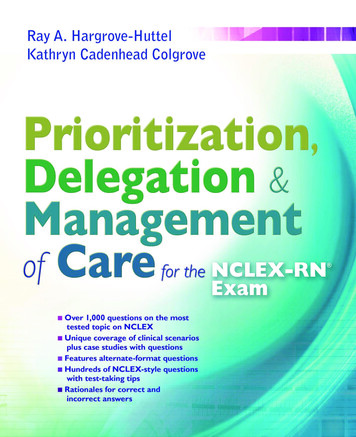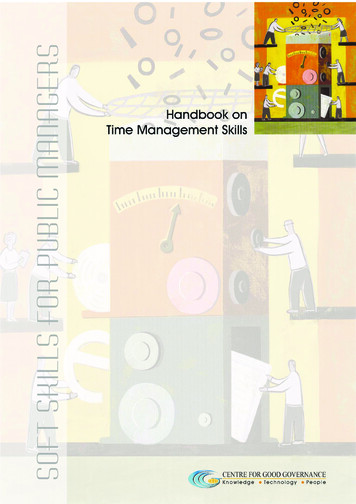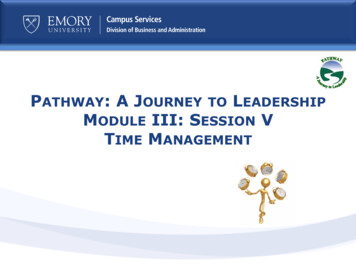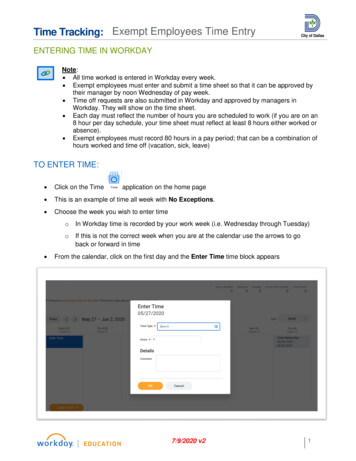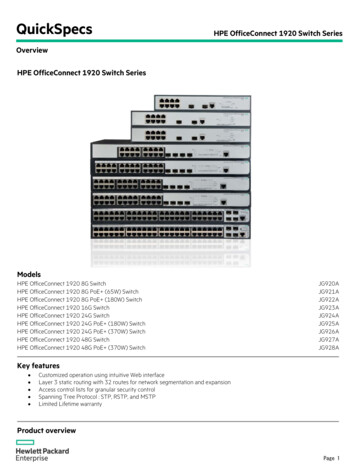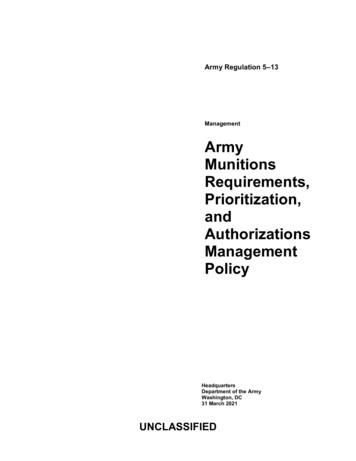
Transcription
Prioritization and TimeManagementAleta A. Pillai, PhD, RNVickie K. Welton, MSN, RN
Prioritization You may have learned a great deal about this: Studying NCLEX Questions In Leadership Class/Clinical Through other clinicals as your number of patients increased in load Will be one of the skills that will need to be mastered Remember that this comes with time be patient with yourselfWrite down for us . What are your biggest concerns aboutprioritization/organization? We are going to hope to give some information to help J
Prioritization- As you begin working First . Arriving early 20-30 minutes can set the tone for the day and allowyou to assess the surroundings mentally readying yourself So you are getting report What should you ask Don’t feel shy to ask the off going nurse what you need to start to prioritize your day Upcoming procedures/testingUpcoming labs (especially important or timed labs- cardiac enzymes, PTT)ADL/physical needsSpecial treatments- IV’s and fluids, wound care, dressing changes IV, central lines, tubing, etc.Concerns for the patient including needed follow up by you Utilizing SBAR and bedside report will help you start prioritization and catch neededinformation
Prioritization Some of this may sound familiar Per Joyce L. Nelson MS,RN,NES See the importance in thinking about your own thinking- (Metacognition) and reflecting As you begin to arrange your day: “What are you going to do first? Why?”“Which is more important? Why?”“What could happen if you do not do this now”?“What is most important to the patient”? Listen to them *Do you think this process of self-questioning will actually slow you down in your day? As you look back on your day- you are learning the routine of the unit Think through your decisions, reflect on them, dialogue with other nurses Even journaling has been found to help in reflection Reflection as a new nurse will help you see the “whole picture” of the day- what went well, what did not
Prioritization Set some goals for yourself during the day You start at 0700- by 0900 all assessments and morning documentation willbe completed, you can start pulling medications and have those completedby 1030, so you can get caught up on new Dr’s orders after she visited thismorning You have this great plan and poof . It all goes awry and you get behind This is okay J Flexibility and resilience to understand this is going to happen is key tomoving forward and learning from each day Taking the day hour by hour may work to lower stress and not focus on all the things thathave to be done for the rest of the shift A bad shift does not make you a bad nurse
Prioritization/Organization What is the purpose of carrying an “organizational sheet”? There are many sheets out there that can help Can use one that is pre-made Or you can make your own ***Most important is that it is functional for you!!!!
Organization of Care Learn to cluster care Combining interventions will improve your efficiency & reduce wasted energy Clustering care also benefits patients especially at night reduces sleep deprivation Clustering by Tasks: What all can you do while you’re in the patient’s room? Complete assessment along with passing medications Location: What patient rooms are closer together? Time: What tasks need completed around the same time? Example: 14:00 Lovenoxinjections on several patients Concepts/Skills: What if 3 patients need new IVs? Grab your supplies & go room toroom
Communication Preceptors! Help us Learn all you can from your preceptor Actually any experienced nurse/charge nurse/nurse manager can help Have some “go to” people that can answer questions for you There are not dumb questions Some nurses question when new nurses don’t ask any questions If you need help ask!!! Be specific on what you need help with when asking for help Take all feedback and debrief sessions And learn how to repeat or refine processes In fact ask for feedback on your performance and during performance appraisals
Patients & Family: Communication Skills Communication: What is the scariest for you? Talking to Patients? Talking to Families? Communicating with Patients & Family Members LISTEN to their concerns. They want to be heardIf patient gives permission, explain what you’re doing to the familySit down with them, at their level instead of standingDo not make promises. Do not say everything will be alright Ask them how they’re feeling. Ask what you can do to help When family members are distraught: find a quiet area where you can sit with them They may be sleep deprived, in shock, and stressed to the max Will get better and better at this as you gain experience Have confidence in yourself as you are communicating
The Art of Delegation Principle of Delegation: The nurse is responsible & accountable for theoutcome You cannot do it all: delegating is vital for your survival 5 Rights of Delegation: Right Task: Is this task appropriate to delegate?Right Circumstance: Is the patient stable for the task?Right Person: Know what the nursing assistant can do at your facility.Right Directions & Communication: Be clear & specific. Be respectful & thankfulRight Supervision & Evaluation: Follow up to make sure delegated task is completed
The Art of Delegation Step 1 Assess and Plan First decision- is the care routine and standard If illness or patient is not stable- do not delegate! If task is complex, needs problem solving or innovation, and outcome may be unpredictable- do notdelegate Important Do not delegate the nursing process We have a duty to answer for the nursing process We have to take into account the skill of the delegate Step 2- Communication If your delegate does not understand what is to be done just lends to problems Very important: Discuss how the task if to be accomplished Be clear and concise- especially when to report back with results
The Art of DelegationStep 3- Surveillance and Supervision Oversight as needed Follow up with reported results-intervene if noted change incondition Step 4- Evaluation and Feedback Was the delegation successful Acknowledge the employee for successful delegation
Survival and Resiliency When accepting a position be aware of Residency, onboarding, and orientation procedures/time Be a team player Get to know your co-workers and those from other disciplines They help you so help them when you can You don’t/won’t know everything That is okay!!! Take time for yourself to reflect and regenerate If you do not retreat from work demands and regenerate you cannot take care of your patients Be aware of how you cope with stress Get sleep!
Transitioning to PracticeResource for Transition Webinar-Might be beneficial and is free! yServlet?target reg20.jsp&referrer &eventid 1375765&sessionid 1&key 689BCF3127E41247B0105835480C8E2B®Tag 91554&sourcepage register Also others at cost https://ww2.learningext.com/newnurses.htm
Transition to Practice First of all know that you can do this!!! It will take practice and time but your perseverance will pay off in Your development The care of your patients, family, and community The puzzle pieces will all begin to fitWhat questions do you have for us?
References Ameritech College of Healthcare (2016). Time management skills every new nursesneeds. Retrieved from lls-everynew-nurse-needs/ Barrow, J., & Sharma, S. (2019). Nursing five rights of delegation. In: StatPearls [Internet].Treasure Island (FL): StatPearls Publishing. Duchscher, J. (2012). From surviving to thriving: Navigating the first year of professionalnursing practice. Saskatoon, Saskatchewan: Saskatoon Fastprint Helping new nurses set priorities (2010). Retrieved -nurses-set-priorities/ Hilton, L. (n.d.) Six tips to survive your first year as a hospital RN. Retrieved six-tips-to-survive-your-first-year-rn Huber, D. (2014). Leadership & nursing care management (5th ed.). St. Louis MO:Saunders. Nelson, L. (2017). 10 things I wish I knew before becoming a nurse- Newbie nurseconfessions. Retrieved from / Nemeth, L. (2014). Performance Appraisal In D. Huber (eds.). Leadership and nursing caremanagement (pp.399-409) St. Louis MO: Saunders Nursing report: Questions to ask during nurse shift to shift report about your patient(n.d.). Retrieved from about-your-patient/
Prioritization and Time Management Aleta A. Pillai, PhD, RN . Prioritization You may have learned a great deal about this: Studying NCLEX Questions In Leadership Class/Clinical Through other clinicalsas your number of patients increased in load Will be one of the skills that will need to b
